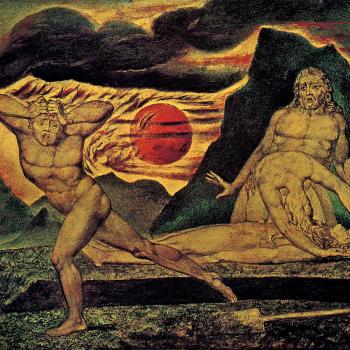Lectionary Reflections
Isaiah 43:16-21
March 13, 2016
Fifth Sunday in Lent
I have long loved Isaiah 43; it is filled with quotable phrases, words that have helped many persons over the centuries. "Do not be afraid, because I have redeemed you; I have called you by name, and you are mine" (Is. 43:1). "You are precious in my sight, and honored, and I love you" (Is. 43:4). "Do not fear, for I am with you; I will bring your offspring from the east, and from the west I will gather you. I will say to the north, 'Give them up, and to the south, 'Do not withhold!'" (Is. 43:5-6) I can imagine that those Babylonian exiles thrilled to hear that they were still loved by YHWH, and that YHWH still had big plans for them despite their long sojourn in a very foreign land. These are words that are designed to buoy up sagging spirits, to energize those who have nearly given up all hope of a fruitful future. In a previous article on this grand chapter, I revealed how much it meant to my wife after she underwent a serious back surgery. Yes, Isaiah 43 is among my favorite passages in all the Bible.
However, the Isaiah 43 text for today is rather more thought-provoking than it is sail-filling. I read it, and rather than swell with pride and hope, I ponder its implications for my own life and the life of the place in which I live. It is no less powerful than those earlier passages, but its power is to tease me into active thought.
I find a startling contradiction at the heart of this text. It begins with a typical paean to the preeminent past activity of YHWH for the chosen people. "Thus says YHWH," thunders Isaiah, employing the long-revered messenger formula of the prophets of Israel, using a phrase that his preceded prophetic oracles for hundreds of years. And he goes on to describe just who this YHWH is. This is the God "who makes a way in the sea, a path in the mighty waters, who brings out chariot and horse, army and warrior" (Is. 43:16-17a). The reference is familiar and central to the belief of all Israelites. This is the event at the Sea of Reeds, that mighty and mysterious confrontation between YHWH and the greatest army in the world, the forces of pharaoh. Miraculously, YHWH was victorious, as the waters of the sea collapsed over the chariots and horses of Egypt, and Israel marched through the sea on dry ground. Just as YHWH pushed the sea back in order to create dry ground in the first chapter of Genesis, so again YHWH has pushed back the sea to create a path for the chosen ones and then has allowed that same sea to return to its flow, thus drowning pharaoh and all his host.
And where is that army now? "They lie down; they cannot rise. They are extinguished, quenched like a wick" (Is. 43:17b). Pharaoh's vast forces have been reduced to nothing more than the last flame of a candle, snuffed out by the waters of the sea. And they are quite literally drowned in the waters, as dead witnesses to the absolute power of YHWH, as an unforgettable proof of the first commandment: "I am YHWH your God, who brought up out of the land of Egypt, out of the house of slavery."
We are with this memory at the very heart of Israelite faith. If we subscribe to this belief we are among the chosen ones of YHWH and can now expect to hear from that God that actions of a similar kind are about to be performed for us. But now surprisingly comes the contradiction. "Do not remember the former things; do not consider the things of old" (Is. 43:18), says the prophet, and immediately we are thrown into a kind of crisis of faith. Are not the central claims of Israel precisely based on memory, more specifically on the memory of YHWH's actions on behalf of the ancestors, Abraham and Sarah, Isaac and Rebekah, Jacob and Rachel and Leah and Joseph and Samuel and Saul and David? Are we not bidden to celebrate these ancient worthies who in their own stumbling ways attempted to do the work of YHWH, however poorly they sometimes did that work? Is not one of the most important words in the Israelite vocabulary "remember"?
Astonishingly, the prophet takes that important word and precedes it with "do not"; do not remember the "former things," perhaps more literally the "first things." (The word used is Hebrew for "head" or "first"; it is in fact the first word of Genesis "in beginning.") And to emphasize his point he adds, "do not consider the old times," using a word, qedem, that can mean "front," "east," or "ancient." However we translate, the prophet very clearly states that we are not to remember or consider past events or actions, even though he has just reminded us of the event at the Sea of Reeds! Just what are we to make of that odd juxtaposition of phrases?
Isaiah answers that question at least in part in the next line. "Look! I am about to do a new thing! It sprouts now; don't you see it? I am about to make a way in the wilderness, rivers in the desert. The wild animals will honor me, the jackals and the ostriches, because I put water in the wilderness, streams in the desert to give drink to my chosen people" (Is. 43:19-20). Here is the problem with these grand sounding phrases: none of them can possibly be true! There is no way across the burning, devouring desert from Babylon to Israel; it is four hundred miles of barren outcrop and endless sand. And there are no rivers there at all. It may be dotted with distant and far-flung oases, but rivers and streams they are not. And jackals and ostriches are not creatures that honor YHWH; they are always signs of places YHWH has either forgotten or destroyed, haunts without people, known for the scavenging danger of these very animals: jackals and ostriches, the former eaters of carrion and dead things, the latter a foolish, flightless bird that apparently has little value at all, save its extraordinary land speed (see Job 39:13-18).





